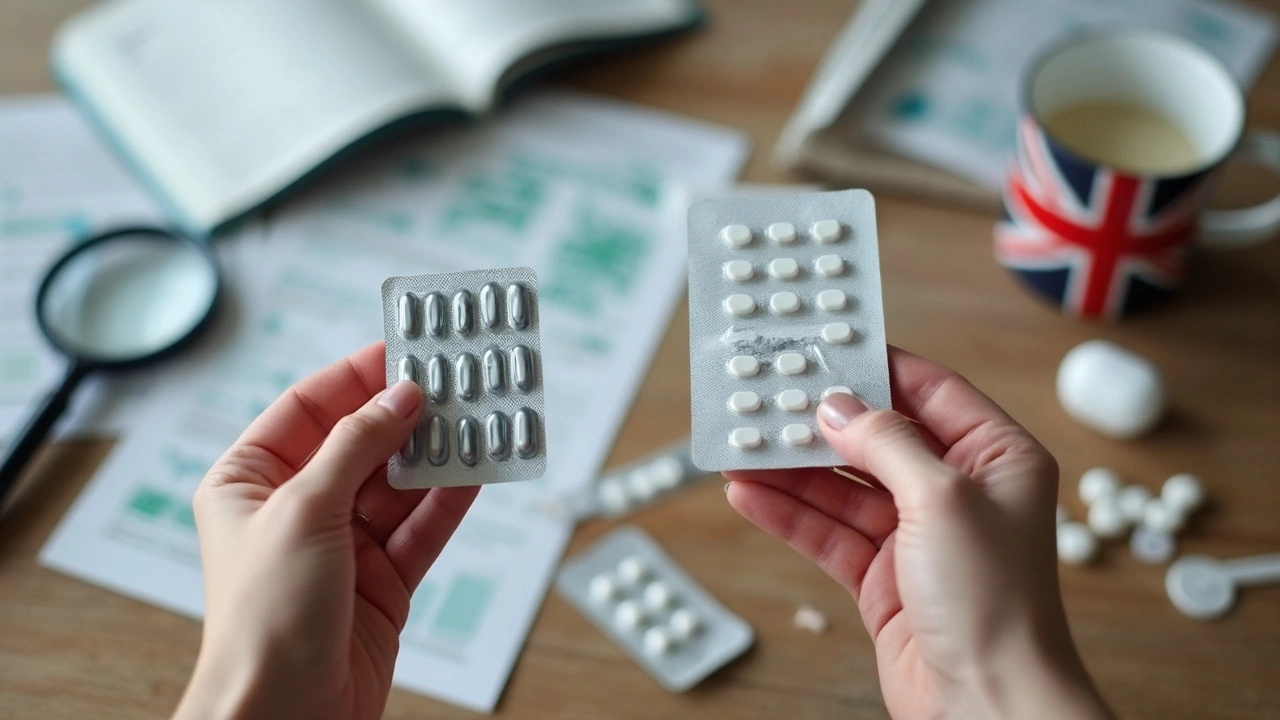Imagine you’re scrolling through health forums and someone swears by a cheap, easy-to-find over-the-counter pill as a substitute for misoprostol. Tempting, sure. Stories like this catch fire fast because people crave more accessible, less intimidating solutions, especially for critical health concerns. But do any of these supposed alternatives work like the real thing, or is it just clever marketing mixed with wishful thinking?
The Science Behind Misoprostol and Its Unique Effects
Let’s get one thing straight: misoprostol isn’t your typical pain reliever or “women’s health” supplement. It’s a synthetic prostaglandin E1 analog, great at making the uterus contract, softening the cervix, and protecting the stomach lining in heavy-duty anti-inflammatory users. It popped up first in the market as Cytotec, originally aimed at stopping stomach ulcers caused by NSAIDs, but people quickly figured out it could induce labor and safely support medical abortion procedures.
What sets misoprostol apart is how specific its action is. Prostaglandins are hormone-like chemicals all over your body—think muscle contraction, healing, inflammation, and even fever. You can find prostaglandin analogs in certain eye drops, labor drugs, and treatments for stomach ulcers, but trying to mimic this effect with random off-the-shelf pills just won’t cut it. The mechanism is like a key in a lock. The wrong key—even if it’s shaped a bit like the right one—won’t open the door.
Here’s a quick look at how misoprostol stacks up on the science side:
| Property | Misoprostol |
|---|---|
| Type | Synthetic prostaglandin E1 analog |
| Main Uses | Preventing gastric ulcers, inducing labor, medical abortion |
| OTC Status | Prescription only in almost all countries |
| Formulations | Tablets, sometimes oral solution |
| Typical Dosage (for abortion) | 800 mcg buccally or vaginally |
Real talk: The FDA has not approved any over-the-counter medicine that replicates misoprostol’s specific uterine actions. Even herbal supplements hyped on social media for “feminine support” don’t come close in data, standardization, or safety.

Hyped OTC Alternatives: Facts, Half-Truths, and Myths
When desperation or curiosity hits, Google and Reddit turn out a ton of suggestions. Folk remedies, homeopathy, “China pills” from shady websites—these make the rounds constantly. You’ll see parsley tea, dong quai, blue cohosh, castor oil, and even high-dose vitamin C. People share anecdotal stories hoping these can bring on a period, soothe cramps, or just work as a household hack when the real deal is out of reach. But anecdotes don’t replace clinical trials.
Let’s size up the most common suggested substances that get compared to misoprostol. Here they are—no sugarcoating:
- Blue Cohosh: Herbalists say it’s a “uterine tonic.” Clinical studies, when they exist, show it increases the risk of side effects like nausea, high blood pressure, and heart problems—no reliable data proves it actually induces uterine contractions safely like misoprostol does.
- Dong Quai: Touts itself as the “female ginseng.” In mouse studies, some mild uterine stimulation is seen, but not at the scale or safety needed for pregnancy intervention. At best, it supports menstrual cycle regularity—definitely not a misoprostol clone.
- Parsley Tea and Vitamin C: Popular on YouTube. No scientific basis whatsoever. Drinking parsley tea or overdosing on vitamin C might leave you with a sour stomach, nothing more.
- Castor Oil: It will get your intestines moving, sure, but any uterine cramps come from dehydration and GI spasms, not targeted prostaglandin effects. Trying this for anything beyond constipation is just risky business.
- Mifepristone Substitutes: Sometimes “misoprostol alternatives” lists include drugs or herbs meant to mimic mifepristone, which is actually a totally different medication that blocks progesterone, not a prostaglandin at all. Don’t mix these up!
The only products that can accurately claim to duplicate prostaglandin effects in the uterus are prescription prostaglandin drugs, mainly misoprostol itself or very close cousins like dinoprostone. Even ibuprofen—another prostaglandin pathway drug—acts in a completely unrelated way and is used for pain, not uterine contraction.
If you dig deeper online, you might stumble across supposed over the counter medicine similar to misoprostol, but most of these sites push herbal blends, questionable internet supplements, or vague “feminine wellness” pills that don’t even list their ingredients. None have passed real medical testing for uterine contractility, let alone safety. It’s easy to get swept up in hype, but when it comes to serious medical effects, relying on folklore is a risky gamble.

What Really Works? Navigating Safe Options and Solid Information
If you actually need misoprostol or something with real prostaglandin action—say for labor induction, miscarriage management, or medical abortion—your best bet is seeing a licensed healthcare provider. Trying to get these effects from random “natural” OTC products sets you up for disappointment at best or health risks at worst. Pharmacies are strict with good reason, and mail-order websites that pop up in your social ads are rarely truly regulated.
Still, there’s a reason people keep searching. Access barriers—think local laws, high doctor costs, or supply chain shortages—make folks desperate to find help. If you’re stuck without prescriptions, here are a few tips to avoid getting scammed or hurt:
- Look for detailed product ingredient lists (if a site won’t share them, steer clear).
- Check with licensed telemedicine services first; some now mail prescription meds discreetly after a quick consultation, if local law allows.
- Avoid any herbal blend promising “abortion-pills-in-a-box”—there’s zero evidence for effectiveness and high risk for contamination.
- Ask a doctor or pharmacist directly about legal alternatives—they can provide up-to-date info on what’s available in your country.
- Remember: most herbal uterine stimulants are way less potent than misoprostol, don’t always work, and often have unpredictable side effects.
Don’t trust product reviews alone; faked reviews are everywhere, especially on pharmacy drop-ship websites that change names every month. If money is tight, search for nonprofit harm-reduction clinics or online resources that help connect people to safe, doctor-backed care—these groups keep tabs on what’s real, what’s risky, and what’s a flat-out scam.
If you just need the pain-relief or anti-inflammatory effects (not pregnancy-related help), common OTC drugs like NSAIDs or acetaminophen do their job, but they do not act as true prostaglandin analogs in the uterus. The takeaway: profound uterine effects demand real prescription prostaglandins.
At the end of the day, the honest answer is kind of boring. Despite what you see on TikTok, hear from friends, or read on questionable “wellness” blogs, no over-the-counter medicine available right now matches the proven, targeted strength of misoprostol. Maybe that changes in five or ten years if regulators shift, but for now, sticking to doctor-approved choices is the only path that actually works—and keeps your health intact.


VAISHAKH Chandran
India has a long tradition of scientific rigor and the modern world would do well to emulate it over chasing dubious herbal hacks The pharmaceutical standards we uphold are a testament to our commitment to safety and efficacy While the internet spreads rumors about over‑the‑counter miracles the truth remains that misoprostol is a regulated drug and nothing short of that should be trusted
May 20, 2025 AT 21:58
Pat Merrill
Oh, the internet’s pharmacy aisle-where the line between myth and medicine blurs into a fog of clickbait.
One can spend hours scrolling through forums only to discover that the supposed "OTC miracle" is nothing more than a marketing illusion.
The chemistry of misoprostol is not something you can replicate with parsley tea or a handful of vitamins, despite what the most enthusiastic TikTok influencers would have you believe.
In fact, the drug is a synthetic prostaglandin analog, a molecular key designed to fit a very specific lock in the uterus.
Any attempt to substitute it with a generic herb is as effective as trying to replace a Ferrari with a bicycle.
Yet, the audacity of some self‑proclaimed wellness gurus to sell you a "feminine support" pill is truly astounding.
They sprinkle vague claims about "balancing hormones" while ignoring the fact that regulatory bodies have refused to grant any such product approval.
You might argue that access barriers justify experimentation, but the risk of unpredictable side effects is not a price worth paying.
Consider the documented cases where blue cohosh caused severe hypertension and heart complications, a reminder that natural does not equal safe.
Moreover, the legal ramifications of using unapproved substances for abortion can be severe, especially in jurisdictions with strict laws.
If you’re looking for pain relief, a simple NSAID will do the job without courting disaster.
If you need the uterine contractile power of misoprostol, the only reliable route is a prescription from a qualified professional.
Telemedicine services have emerged as a legitimate option, delivering the medication discreetly while maintaining proper medical oversight.
So before you click 'buy now' on a mysterious supplement, remember that the internet is a marketplace of both information and misinformation.
In the end, the most sensible choice is to seek evidence‑based care rather than gamble on folk remedies.
Stay safe, stay informed, and maybe save yourself a costly disappointment.
June 2, 2025 AT 22:42
Vicki Roth
I’ve seen a few threads where people claim herbal teas can induce labor, but the evidence is mostly anecdotal and not peer‑reviewed. The article does a solid job of separating what’s scientifically backed from what’s pure speculation. It’s a good reminder to always consult a healthcare professional before trying any off‑label remedy.
June 15, 2025 AT 23:25
Vishal Bhosale
Honestly many of these so‑called alternatives are just hype. If you want reliable results, stick to proven medicine. Anything else is a gamble.
June 29, 2025 AT 00:09
Garima Gauttam
The quest for a shortcut often reveals more about our impatience than about medicine. While the market touts miracle cures, the body adheres to its own immutable laws. One could argue that seeking an OTC substitute is an act of rebellion against established science. Yet rebellion does not rewrite biochemistry. In the end, the universe remains indifferent to our desperation.
July 12, 2025 AT 00:53
Georgia Nightingale
Picture this: a midnight scroll through a forum, a desperate heart clinging to the promise of a tiny pill that will change everything. The drama unfolds as users chant the virtues of “natural” solutions, ignoring the cold, hard data. I’ve read countless studies showing that misoprostol’s mechanism cannot be mimicked by any herbal concoction. The narrative that "it works" is pure theatrics, a stage play performed by profit‑driven sellers. Let’s cut the curtain and face the reality-without a prescription, you’re just an audience member to a tragic comedy.
July 25, 2025 AT 01:36
Chris Kivel
Thanks for the clear breakdown; it really helps navigate the noisy landscape.
August 7, 2025 AT 02:20
sonia sodano
Wow, another article telling us the same old story-yeah, sure, prescription drugs are “the only way.” But have we considered that refusing to explore alternatives keeps the status quo intact? I love how the piece frames every herbal option as a myth, yet you can’t deny the curiosity it sparks. Still, the safest path is to stay grounded in evidence, no matter how boring that sounds.
August 20, 2025 AT 03:04
Praveen Kumar BK
First, let’s get the facts straight: misoprostol is a prescription‑only prostaglandin analog, not a kitchen spice. Second, any claim that an over‑the‑counter pill can replicate its uterine effects is scientifically unfounded. Third, promoting such myths does a disservice to public health and fuels dangerous misinformation. Lastly, the responsible choice is to seek professional medical advice rather than gamble on unverified supplements.
September 2, 2025 AT 03:47